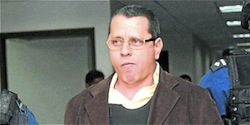Colombia’s Supreme Court has approved the extradition of ex-paramilitary leader Julian Bolivar, raising questions about the fate of other former paramilitaries who have completed their sentences and the FARC leaders currently involved in peace negotiations with the government.
On February 12, Colombia’s Supreme Court approved the US government’s extradition request for Rodrigo Perez Alzate, alias “Julian Bolivar,” the former military leader of the Central Bolivar Bloc, part of the United Self-Defense Forces of Colombia (AUC).
Although Julian Bolivar has already completed his eight-year prison sentence under Colombia’s Justice and Peace reparations process, he is wanted by the US Attorney’s Office in the Southern District of Florida for drug trafficking. The Drug Enforcement Administration (DEA) believes Julian Bolivar continued to run drug trafficking operations from prison, charging taxes on cocaine laboratories in Colombia’s Bolivar province and controlling clandestine landing strips, reported El Tiempo.
Julian Bolivar’s associate Carlos Mario Jimenez, alias “Macaco,” was extradited to the United States in 2008, as was Julian Bolivar’s brother Guillermo Perez Alzate, alias “Pablo Sevillano.” Julian Bolivar’s legal defense initially argued that the ex-paramilitary leader should not be extradited because he was already sentenced for drug trafficking under the Justice and Peace law, but the Supreme Court determined that his drug trafficking activity went far beyond the parameters of the reparations process.
President Juan Manuel Santos still has to sign the extradition order before it can be completed. However, a high-level government source consulted by El Tiempo said the executive branch had no objections to Julian Bolivar’s extradition.
Another former paramilitary leader, Daniel Rendon Herrera, alias “Don Mario,” also faces extradition to the United States for drug trafficking. Santos signed his extradition order in December, but Colombian authorities determined that before Don Mario can be extradited, he has to face additional charges in Colombia.
US authorities are also hoping to extradite former paramilitary leaders Freddy Rendon Herrera, alias “El Aleman” and Ramon Isaza, in addition to several others, reported El Tiempo. The US government’s initial request for El Aleman’s extradition was denied in 2010 because the ex-paramilitary leader still had legal processes pending in Colombia.
InSight Crime Analysis
The Supreme Court’s decision to extradite Julian Bolivar, and Santos’ previous approval of Don Mario’s extradition, could have serious implications for the peace negotiations between the Revolutionary Armed Forces of Colombia (FARC) and the Colombian government.
Both Don Mario and Julian Bolivar participated in the Justice and Peace process under the assumption that they would only serve eight years in exchange for providing information about their criminal activities. When InSight Crime interviewed Julian Bolivar during the reparations process, the ex-paramilitary leader stated that he planned to cooperate fully with the courts, but Colombia’s Attorney General’s Office has since accused him of withholding information. Don Mario, on the other hand, revealed details of the ties between the AUC and the country’s politicians and security forces.
SEE ALSO: AUC News and Profile
In light of the pending extradition of these paramilitary bosses, FARC leaders negotiating with the government may be wary of signing a peace agreement. Numerous FARC commanders are wanted in the United States for drug trafficking, and may now fear that the government’s promises won’t keep them from landing in a US prison.
Another potential problem with the reparations process is the fate of the paramilitary leaders who are released from prison. On February 10, the Supreme Court granted the freedom of Francisco Prada, alias “Juancho Prada,” the first ex-paramilitary leader to be freed after completing an eight-year sentence through the Justice and Peace process, according to El Colombiano.
As of September 2014, 161 former paramilitaries became eligible to request their release from prison, including El Aleman. Several have already attempted to secure their freedom, but the courts have denied their requests because of additional criminal charges or failures to fulfill their obligations in the reparations process.
However, those who are released face an uncertain future. Some, like El Aleman, have strong ties to the paramilitary successor groups — known as BACRIM (from the Spanish for “criminal bands”) — now overseeing much of the country’s drug trafficking, and they may return to criminal activity once they are freed. In El Aleman’s case, his brother Don Mario founded the Urabeños, the country’s most powerful BACRIM, with some of El Aleman’s former fighters.
SEE ALSO: Urabeños News and Profile
Other former paramilitaries may attempt to retake control of their former stomping grounds, while those who have acted as informants or retain valuable assets in the areas they oversaw will likely find themselves targeted for assassination by the criminal groups now in control.

